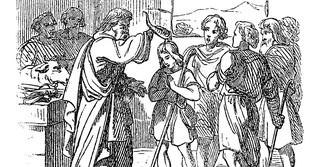How "the Name of the Lord is a Strong Tower" for Believers
Share

In Proverbs 18:10, we read of this security: “The name of the LORD is a strong tower: the righteous run into it, and are safe.” One of the greatest defenses that we have in this world to help us fight against the devices of Satan, is the name of the Lord. Once we begin to gain an understanding of this important aspect of the Christian life, we will then begin to grasp the absolute security that we have in Him.
Let’s take a closer look into this verse in order to unlock the pure power contained in it.
Photo credit: Unsplash/Boban Simonovski
What Is a Strong Tower?
Looking at the original language, (which in this case is Hebrew), we find that the word “defend” in Psalm 20:1 means, “to be set safely and securely on high; to be too high for capture”; and by implication means, “to be too strong so as to be inaccessible.” When we compare this to Solomon’s phrase, “strong tower,” the connection is unmistakable.
A strong tower is an elevated tower. Could it be that it is it so elevated, as to be high, or inaccessible for capture? I do not think that it is a stretch to come to this conclusion. One of the uses for towers in the Old testament is that they were used as fortresses in times of war. We read from Judges 9:51: “But there was a strong tower in the city, and all the men and women — all the people of the city — fled there and shut themselves in; then they went up to the top of the tower.” Nineteenth-century biblical scholar George Bush said of these towers:
“Doubtless a sort of citadel such as exists in most considerable towns in western Asia, and which serves the people as a last retreat when the town is taken by an enemy, and where the people shut themselves up on occasions of popular tumult. In some parts of the East, such towers are to be seen in the open country, where the neighboring peasantry may deposit their more valuable property, or themselves take refuge, when the approach of an enemy or of a plundering tribe is expected…”
It is of interest that all the people went up to the very top of the tower because it was, as we have explained, high, and inaccessible for them to be captured. Such a tower is truly a strong place!
Does Translation of Proverbs 18:10 Impact the Meaning?

We can gain an even greater understanding of Proverbs 18:10 by looking at several different translations that will reveal certain nuances of the original languages.
Starting with the NIV, we read: “The name of the LORD is a fortified tower; the righteous run to it and are safe.” We note the slight change in wording here, where the NIV uses the word “fortified,” which does no violence to the verse, but rather enhances it; something that has been fortified has been thoroughly secured and strengthened for battle.
Can different wording impact how we understand the verse? One of the dangers that can be encountered when dealing with some translations is an unintentional “watering down” of the original meaning. We possibly see this in the Expanded Version. It renders this verse: “The name of the Lord is like a strong tower;·those who do right [the righteous] can run to him for safety [refuge].” Some would take issue with saying that His name is like a strong tower, claiming this takes something away from the force of the original. This observation is very slight, and does not at all ruin the truth concerning His name.
On the other hand, Young’s Literal Translation adds another subtle shade of meaning when it states: “A tower of strength [is] the name of Jehovah, Into it the righteous runneth, and is set on high.” Here, another form of the word “strong” is used when Young says, “a tower of strength.” Referring back to Judges 9:51 where the people went up to the top of the tower, notice that Young states that “the righteous” are “set on high.” All of this also does no violence to our verse; but rather confirms it. He also uses the transliteration of Yahweh, which is Jehovah.
As an aside, one might ask, What is the difference between the names Yahweh, Jehovah, and LORD? The answer is that there is actually no difference. LORD is a transliteration of the name Yahweh, which is a transliteration of the name YHWH; since there is no way to truly pronounce this name, it was given the spelling “Yahweh.” The name Jehovah then is an anglicized version Yahweh.
Photo credit: Unsplash/James Coleman
Who Wrote Proverbs?

The writer of all but two chapters of the book of Proverbs was King Solomon (chapters thirty and thirty-one were attributed to Agur, and King Lemuel, respectively). Solomon would have had firsthand knowledge concerning the truth encased within our aforementioned verse. He ascended to the throne following the death of his father, King David, and just before he died, David spoke these words to his son: “I go the way of all the earth; be strong, therefore, and prove yourself a man. And keep the charge of the LORD your God: to walk in His ways, to keep His statutes, His commandments, His judgments, and His testimonies, as it is written in the Law of Moses, that you may prosper in all that you do and wherever you turn…” (1 Kings 2:2-3).
Solomon’s reign would start well, with him exhibiting and exercising the great wisdom God had given to him. His reign however, though filled with its glories, would not be without its difficulties. The great wall-builder, Nehemiah spoke of Solomon when he said: “Did not Solomon king of Israel sin by these things? Yet among many nations there was no king like him, who was beloved of his God; and made him king over all Israel. Nevertheless pagan women caused even him to sin” (Nehemiah 13:26).
With this in mind, we note that Proverbs was probably written before his descent into idolatry. The book of Ecclesiastes, also written by Solomon, speaks of his vain exploits. His search for fulfillment ends with these words, showing that his life had come full circle: “Let us hear the conclusion of the whole matter; fear God and keep His commandments, for this is man’s all” (Ecclesiastes 12:13).
Photo credit: Unsplash/Aaron Burden
What Was David's Influence on His Son Solomon?

There was one very strong influence on the life of Solomon — his father, King David. David’s reference to the LORD at the very end of his life can be directly attributed to his many other references to “the name of the LORD” throughout the book of Psalms. It is there that David establishes the foundation of the LORD’s name being a strong tower; and though he never actually uses those specific words, there is yet a powerful and striking connection.
When looking back at David’s early life, we see that it serves as ample proof of the trust he had in His name. As a young man standing face to face against the Philistine giant Goliath, he was able to boldly declare in 1 Samuel 17:45: “…You come to me with a sword, with a spear, and with a javelin. But I come to you in the name of the LORD of hosts, the God of the armies of Israel, whom you have defied.” We see that even as an adolescent, David possessed a firm hold and belief in the power of His name, that would not only impact himself and the lives of those around him, but also have an even further reach and effect on the lives of those who would follow. This is one of the reasons why we still speak about his exploits to this day.
Concerning the name of the LORD, we read that David not only praised His name (Psalm 7:17), called upon His name (Psalm 116:17), and proclaimed the excellence of His name (Psalm 8:1), but we also note that, in Psalm 20:1, he writes these words: “May the Lord answer you in the day of trouble; May the name of the God of Jacob defend you.” It is this last statement made by David about “the name of the God of Jacob defending you,” that is probably a direct correlation to his victory over Goliath, and may have also served as the impetus behind Solomon’s own words about the name of the Lord being a strong tower.
Photo credit: ©Getty Images/Zdenek Sasek
What Does the Bible Say about the Name of God?

The various names of God reveal to us His diverse character, which in turn should fill us with awe, because each expression of Himself through His name speaks to us in whatever state we find ourselves in. Looking at just a few of these names, we will see the richness and majesty of our God.
For instance, when we are in need, He is Jehovah Jireh: The LORD Will Provide. When Abraham, in obedience, was about to sacrifice his only son to the LORD, the LORD intervened, and we read: “And Abraham called the name of the place, The-LORD-Will-Provide; as it is said to this day, ‘In the Mount of the LORD it shall be provided’” (Genesis 22:14).
Our New Testament counterpart to this verse can be found in Philippians 4:19 which says: “And my God shall supply all your need according to His riches in glory by Christ Jesus.” When we are in need of healing, whether it be mental, spiritual, or even emotional, He is able to do what no doctor can do; we can trust our Jehovah-Rapha; The God Who Heals.
Speaking to the children of Israel the LORD said: “If you diligently heed the voice of the Lord your God and do what is right in His sight, give ear to His commandments and keep all His statutes, I will put none of the diseases on you which I have brought on the Egyptians. For I am the Lord who heals you” (Exodus 15:26). Jesus himself is ready and willing, according to His will, to heal.
Luke 5:17 says: “Now it happened on a certain day, as He was teaching, that there were Pharisees and teachers of the law sitting by, who had come out of every town of Galilee, Judea, and Jerusalem. And the power of the Lord was present to heal them.” Finally, when life becomes difficult, and when the enemy comes in like a flood, we need the peace of God that passes all understanding (Philippians 4:7). Gideon was a mighty warrior; only he didn’t know it. The LORD spoke to him in Judges 6:23-24, saying: “Then the Lord said to him, ‘Peace be with you; do not fear, you shall not die.’ So Gideon built an altar there to the Lord, and called it The-Lord-Is-Peace.” Truly, everything we need we can find in His name.
Photo credit: ©Getty Images/Eziutka
How Can We Apply This Verse to Our Lives?

The fact that His name alone is a strong tower tells us that all we need to do is run to Him in times of trouble. But is running to the Lord the equivalent of running from our Enemy? I think not. We are told that God is our refuge and strength (Psalm 46:1), our hiding place (Psalm 32:7), and a shelter in the time of storm (Isaiah 25:4); and while Scripture nowhere tells us to run from the Enemy — where else ought we to be, but with the LORD?
We close with the Amplified Version Classic Edition’s rendering of this powerful verse: “The name of the Lord is a strong tower; the [consistently] righteous man [upright and in right standing with God] runs into it and is safe, high [above evil] and strong.” This is the proper Christian posture for the child of God. Go to Him and be encouraged; He has you covered.
Photo credit: ©Getty Images/MoMo Productions
